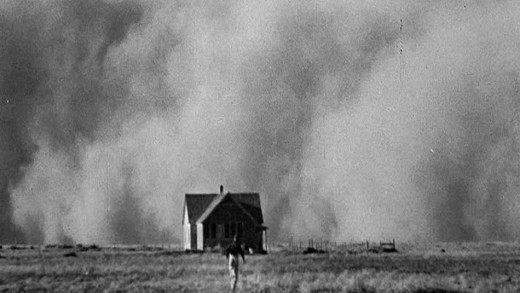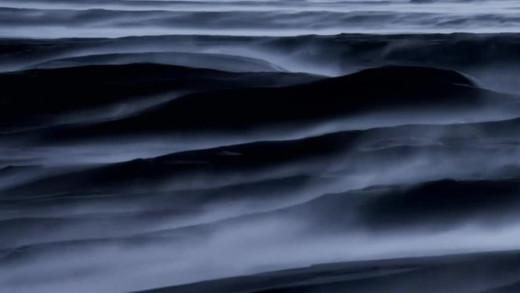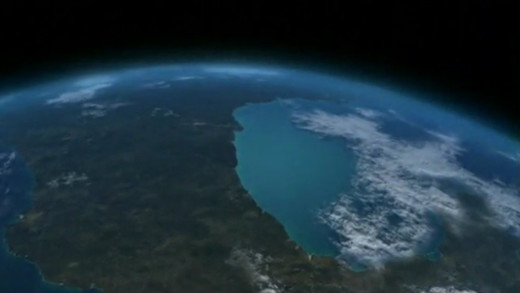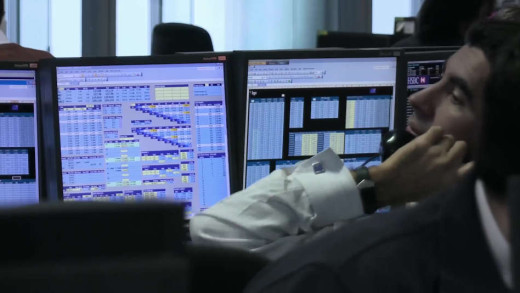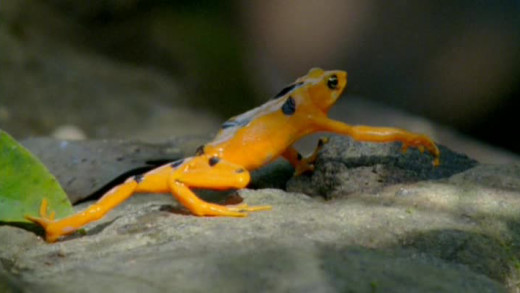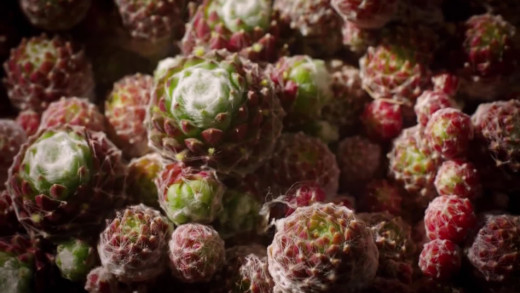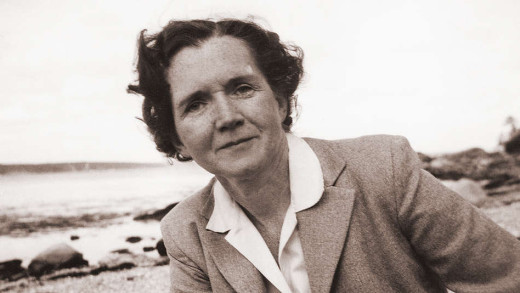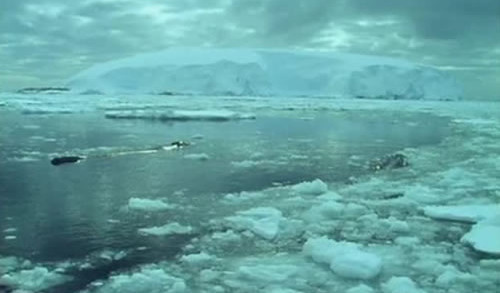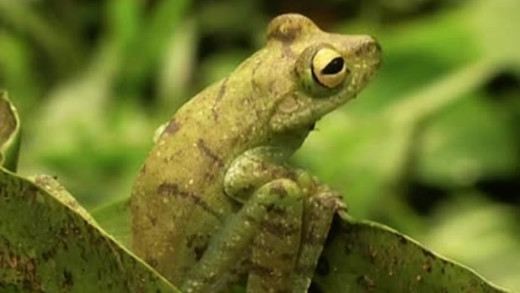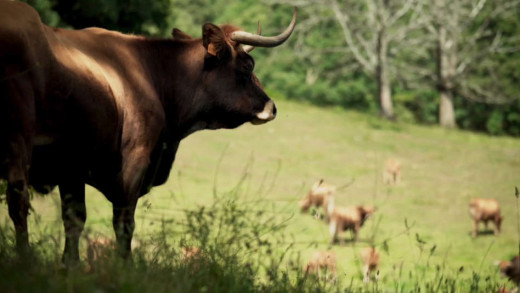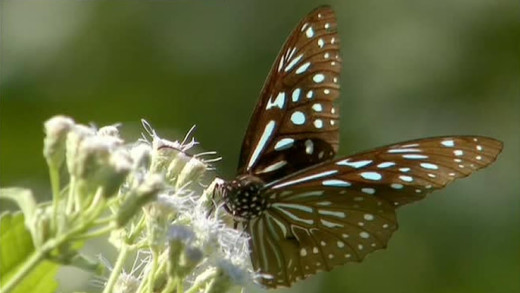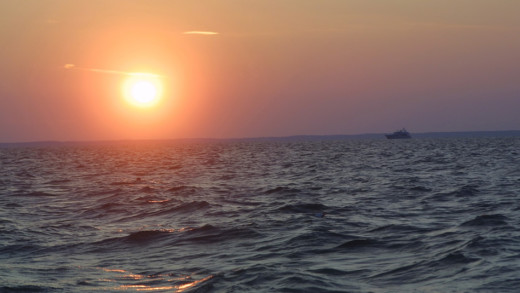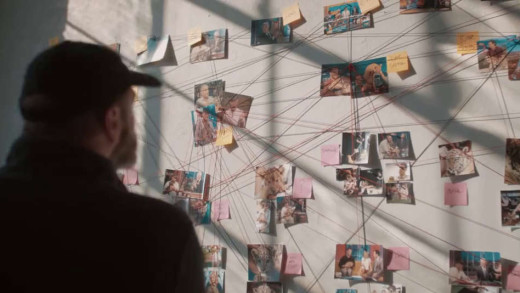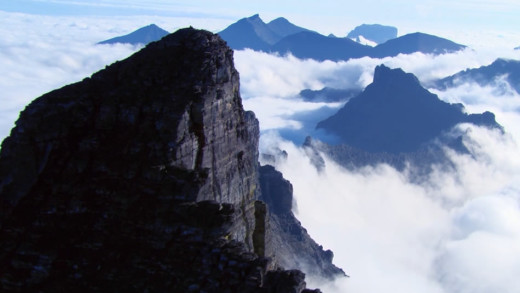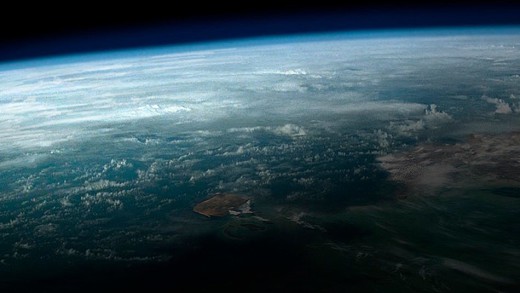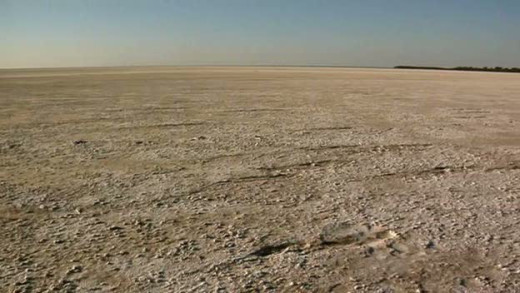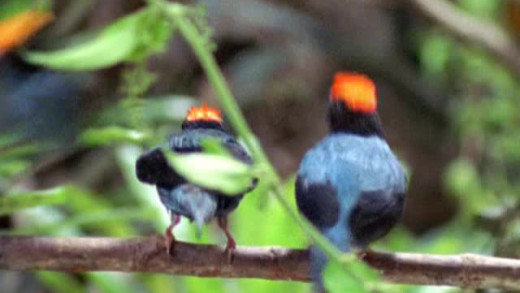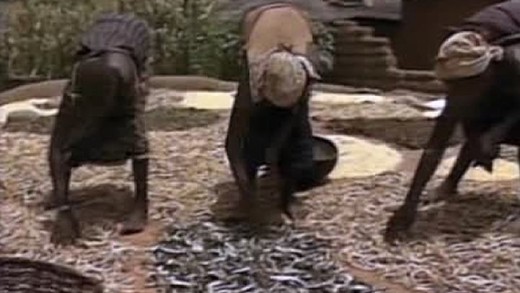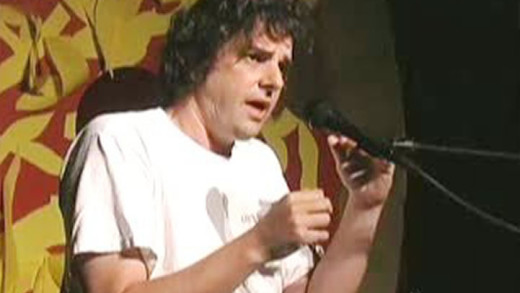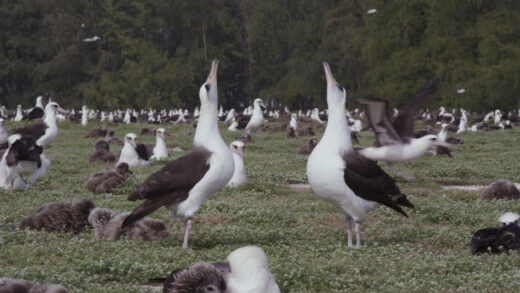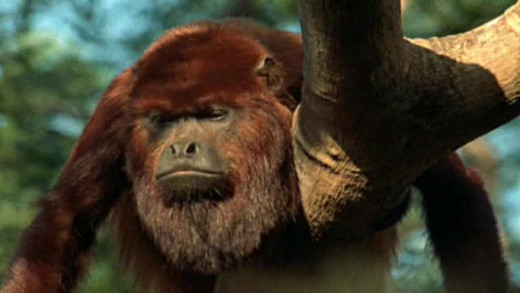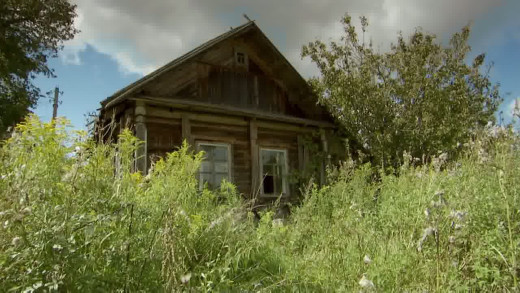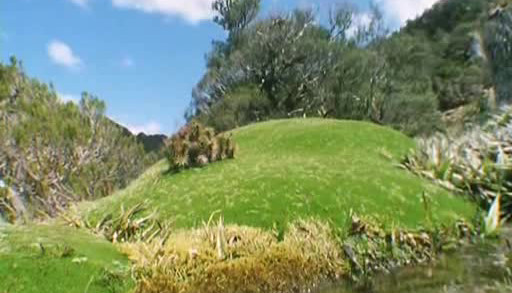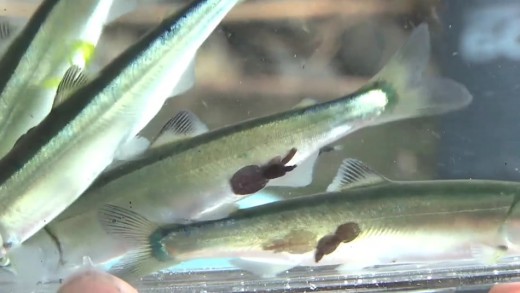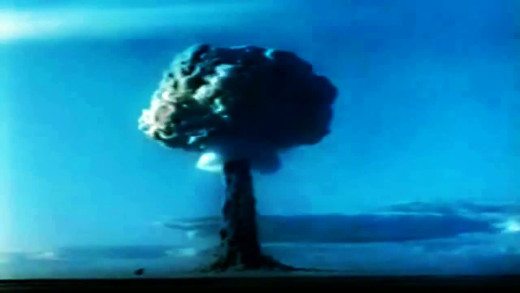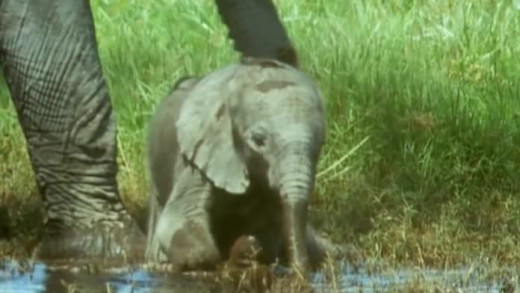The Dust Bowl is a four part series that chronicles the worst human-induced environmental disaster in history. A frenzied wheat boom, followed by a decade-long drought during the 1930s, destroyed much of the American and Canadian prairies through wind erosion. Blizzards killed agricultural crops and animals, threatened many other lives and forced thousands of people to pack up and move somewhere else. The series shows vivid interviews with twenty-six survivors from the dust storms, combined with dramatic photographs and footage from the era, recounting the stories of incredible human suffering at the hands of industrial agriculture--a linear system that destroys top-soil and exploits the land for quick surplus. The series also reveals a morality tale about how this culture exploits the land that sustains us--a lesson we ignore at our peril.
First Life follows David Attenborough on a journey to unconver some of the origins of life on Earth. He investigates the evidence from the earliest fossils, which suggest that complex animals first appeared in the oceans around 500 million years ago, an event known as the Cambrian Explosion. Trace fossils of multicellular organisms from an even earlier period, the Ediacaran biota, are also examined. Attenborough then travels to Canada, Morocco and Australia, using some of the latest fossil discoveries and their nearest equivalents amongst living species to reveal what life may have been like at that time.
Over three programmes David Attenborough travels from Kenya to California to investigate the contesting claims about the current state of our planet. In the first programme he examines the extinction crisis, measuring the disappearance of some species against the mass of life that still remains undiscovered. Then the crisis is explored further by looking at the root causes, where finally, the last programme asks: What are the possible courses of action open to us to sustain the future of life?
In recent years, nature conservation has become a booming business where huge sums of money change hands, and endangered species become exotic financial products. Banking Nature, delves into this hidden world of so-called environmental banking, where huge corporations such as Merrill Lynch and JP Morgan Chase buy up the land and habitat of endangered species, and then sell them in the form of shares. Companies that inevitably harm the environment are then obliged to buy credits to offset the damage that they have caused. In Uganda, we meet men who measure trees to determine how much carbon they store and then a banker from the German firm that sells the resulting carbon credits. In Brazil, the steel giant Vale destroys the rainforest, replaces it with a monocrop tree plantation, and reaps the benefits of environmental credits as if the rainforest was still standing. Banking Nature posits that we disallow the same corporate criminals responsible for the global financial crisis from turning what's left of the natural world into their final corrupt commodities market.
Life In Cold Blood is a five part series studying the evolution and habits of amphibians and reptiles, presented by David Attenborough.
Kingdom of Plants reveals a whole new dimension in the lives of plants, from the most bizarre to the most beautiful. Using time-lapse and pioneering techniques in macro photography, naturalist David Attenborough traces plants from their beginnings on land to their vital place in nature today. We also move from our time scale to theirs, revealing the true nature of plants as creatures that are every bit as dynamic as animals. Attenborough discovers a microscopic world that's invisible to the naked eye, where insects feed and breed, where flowers fluoresce and where plants communicate with each other and with animals using scent and sound.
This biography documents the life of Rachel Louise Carson who was an American marine biologist, author, and conservationist. Her book Silent Spring, and other writings, are widely recognised to be responsible for advancing the global environmental movement. Carson began her career as an aquatic biologist in the United States Bureau of Fisheries, and became a full-time nature writer in the 1950s, turning her attention to conservation, especially some problems that she believed were caused by synthetic pesticides. The result was Silent Spring, published in 1962, which brought environmental concerns to the public at large. Although the book was met with vicious attacks from chemical companies, Carson spurred a reversal in national pesticide policy, which led to a nationwide ban on DDT and other pesticides, and also inspired a grassroots environmental movement that led to the creation of the Environmental Protection Agency. This film is an intimate portrait of the woman whose groundbreaking work revolutionised our relationship with the natural world.
Life In The Freezer is a study of the seasonal cycle of Antarctica, exploring how different species survive throughout the course of a year.
All over the world, species are going extinct at an extraordinary rate--currently around 250 per day--a scale never before seen. Call of Life investigates the growing threat to Earth’s life support systems from this unprecedented loss of biodiversity by exploring the causes, scope, and potential effects of this mass extinction. The film also looks beyond the immediate causes of the crisis to consider how our cultural and economic systems, along with deep-seated psychological and behavioral patterns, have allowed this situation to develop and be reinforced, and even determine our response to it. Call of Life tells the story of a crisis not only of nature, but also of human nature; a crisis more threatening than anything human beings have ever faced...
Sustenance
A group of friends become curious about the sustainability of their eating regiments. They instigate a challenge, and send filmmaker Yasi Gerami off on a quest to investigate the sustainability of their eating ideologies. The friends come from different backgrounds and live in Toronto, Canada, but the inquiry takes the story of their food around the globe. As Gerami digs deeper, she realises the inconvenient truths not only about the environmental catastrophes caused by our dependence on mainstream food production methods, but also by the cataclysmic social justice impact of our eating habits in the global south. The film unfolds some popular myths on topics such as plant-based diets, healthy and nutritional foods, ethical eating, food politics, industrial agriculture, and how to attain a sustainable food culture. Sustenance helps the viewer discover these themes, prompting the viewer to question where our food really comes from, and how it genuinely affects the health of other people, other species, and ultimately the entire planet.
Life In The Undergrowth specifically focuses on the life, evolution and habits of invertebrates from all over the world.
Poisoned Waters investigates some of the root causes of what we see worldwide with ecological collapse, dead-zones and pollution effecting oceans, rivers and watersheds. With a focus on major waterways in the United States such as the Chesapeake Bay and Puget Sound, the film follows the culmination of decades of evidence that today's systemic and growing environmental collapse comes not only from the toxic activities of industry, agriculture and massive suburban development; but also from the permeated satiety of chemicals in prolific consumer products such as face-creams, deodorants, prescription medicines and household cleaners. This is a startling reminder of the compounding threat facing our world and the need to act imperatively.
The Conservation Game follows the story of Tim Harrison, an Ohio cop who stumbles upon a bombshell discovery while undercover at an exotic animal auction. He starts to suspect that America's top television celebrity conservationists may be secretly connected to the exotic pet trade. As his investigation leads deeper into the secret world of the big cat trade, Tim and his team take their fight to the halls of Congress, pressing lawmakers to pass federal legislation that would end the private breeding and exploitation of these endangered animals. But when opposition comes from an unexpected source, Tim is forced to face the demons of his own past, while wrestling with the consequences of exposing his childhood hero.
Planet Earth is a comprehensive series of eleven episodes that each feature a global overview of a different biome or habitat on Earth.
The Planet is a stylised observational video commentary that brings together an overview of the many global changes set about by industrial civilisation. Viewed through the myriad connections between consumerism and the false notion of a perpetually expanding economy on a finite planet, the film peers across the globe to reveal systemic exploitation; species extinction driven by industrial agriculture, logging, mining, manufacturing, pollution, the age of oil and plastic, etc; climate change; carrying capacity and population growth; while also positing that we—as in you and me—can do something, anything, to stop the destruction.
Made from the same elements as stars, plants, food and human beings, dirt is very much alive and very much just as complex. One teaspoon of dirt contains a billion organisms working in balance to sustain a series of thriving communities that have become pretty much totally invisible to our daily lives. Dirt -- The Movie tells the story of Earth's most valuable and underappreciated source of fertility, from its miraculous beginning to its tragic degradation...
For years, regulatory agencies and environmental groups have insisted that the increase in whale deaths off the East Coast of the United States has nothing to do with the rapidly-expanding wind industry's high-decibel pile driving, sonar mapping, and boat activities, to install wind-harvesting facilities for electricity generation. Thrown To The Wind travels to parts of the ocean where these activities are underway, to investigate these claims, showing that indeed these industrial activities are impacting critically endangered species in profound ways--which are being systematically ignored, while the climate and ecological crisis rages.
The Life of Birds follows the evolution and habits of bird species all across the globe, showing how a huge variety of birds each deal with a different aspect of life.
Is the human population going to outstrip the Earth's food supply? The effects of modern agriculture not only lead to a short term food surplus which quickly slipped as population boomed, but agriculture itself causes huge environmental problems such as soil erosion, salinity and chemical pollution—all further illustrating an impossible system in perpetuity. Food or Famine looks at projects in North America, Chile, Indonesia, Africa and India which are participating in a worldwide movement to return to local food growing methods based on the land and healthy ecological principles. The film also examines the worldwide imbalance between food consumption and production, stoking the need to confront the mounting challenges ahead...
What if you live in the most destructive culture ever to exist? What if that culture refuses to change? What do you do about it? Derrick Jensen, the author of Endgame responds to these imperative questions and details how industrial civilisation and the persistent and widespread violence it requires is ultimately unsustainable—and what to do about it. Jensen weaves together history, philosophy, environmentalism, economics, literature and psychology to produce a powerful argument that demands attention...
Albatross is a collaborative film project with artist Chris Jordan and photographer Manuel Maqueda. The film is the culmination of many years of research and study of the issue of ocean plastic pollution, with a paricular focus on how it effects species of Albatross on a tiny atoll in the centre of the vast North Pacific Ocean. The resulting film is an experience that is devastating, not only for the plight of suffering birds, but also for what this crisis reflects back about the destructive power of the culture of mass consumption, and its damaged relationship with the living world.
The Life of Mammals is a ten part series that follows the evolution and habits of various mammal species around the world. Each episode looks at one or several closely related mammal groups and discusses the different facets of their day-to-day existence and evolutionary origins.
One generation from now, most people in the United States will have spent more time in the virtual world than in the natural world. New media technologies have changed lives in countless ways. Streams of information now appears in a click. Overseas friends are contactable in an instant. Engulfing video games and streams of endless entertainment to stimulate the senses, dazzle the mind and pander to the acculturated desire to be in control. Even grandma loves Wii. But what are people missing when they're behind screens? How is it already impacting our children, our society, and the planet? At a time when people are at screens more than they are outside, Play Again explores the challenge in dealing with the addiction and returning to the real world...
In 1986, a catastrophic nuclear accident occurred at the Chernobyl Nuclear Power Plant in Ukraine. An explosion and fire released large quantities of radioactive contamination into the atmosphere, which spread over much of Western USSR and Europe. Life After Chernobyl uses this event to show how wild nature reacts and survives when the world is suddenly rid of the impacts of industrialisation. Travelling to the site of Chernobyl, animals return, forests regrow, buildings disintegrate into grass -- perhaps saying in a rather horrific way that a nuclear accident is better for the natural world than industrial civilisation...
The Private Life of Plants studies the growth, movement, reproduction and survival of plants. The series looks at various aspects of a plant's life-cycle, using examples of species from all around the world.
Salmon Confidential follows renowned biologist Alexandra Morton as she finds that wild salmon are testing positive for dangerous European salmon viruses associated with industrial salmon farming worldwide, and then, how a chain of events is set off by the Canadian government to suppress the findings. Scientists are gagged, research suppressed, evidence not allowed. With the industrial fish farms having moved into Morton's neighbourhood in the late 1980s, since then, there has been a serious decline in wild salmon in the region. So, tracking her findings, the film follows Morton and her team as they move from courtrooms, to Canada's most remote rivers, Vancouver grocery stores and sushi restaurants, providing insights into the workings of government agencies tasked with managing the 'safety of fish and food supply,' that always seem to put industry and the needs of corporations over the natural world, time and time again. Salmon Confidential becomes a call to action to help save the wild salmon from these atrocities, before they're completely wiped out forever.
The myth that humans are superior to all other life forms is a fundamental and unquestioned premise of dominant culture. It is an old historical idea, rooted in colonialism, and is deeply embedded in religion and science. It is one of the root causes for the destruction of the natural world, animal cruelty, war, the extinction of species and other immense problems. The Superior Human? challenges this arrogant and self-destructive ideology; unwinds the myths, using examples and common sense.
The Trials of Life is a comprehensive study of animal species that takes a broad overview of nature and ecology. The series documents the different aspects of the journey through life--from birth to adulthood and continuation of species through reproduction.
